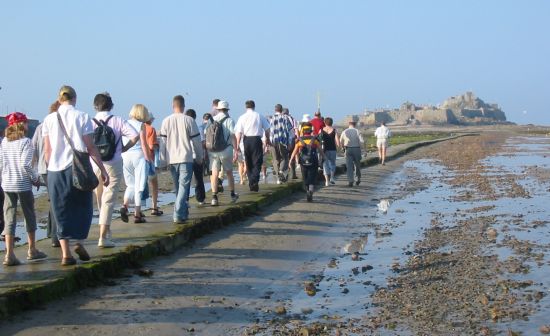|
From 'Orthodoxy and the World' www.pravmir.com Our Faith
There are many problems for me with organised pilgrimage. I do not take to holy jollies such as we see in the Canterbury Tales or their modern versions of comfortable coach parties of pilgrims with thermos, food, pleasant talk and laughter, all heading off for holy destinations. There are church services and edifying addresses by popular, charismatic elders. Sometimes the pilgrims stay a few days in what our grandparents would call luxury. The effort has gone out of it and this to my mind is a pity. Two pilgrims from Scandinavian literature remain fixed in my mind. The first is Authun, the medieval Icelander of poor family with an eye to a good chance and the dedication to pull it off. He captures a polar bear, gives it to the King of Denmark, playing him off against the King of Norway. He then gains leave from the Danish court to go on a pilgrimage to Rome. He sets off in high honour and only after a long lapse of time does he return north. He is unrecognisable, in rags, bald and scarred by disease and penniless. Ashamed of his state he hides from the King’s presence. The King senses his presence and calls him forth. The courtiers mock the beggar man and the King reproves them for ‘Authun has taken better care of his soul than they’. A new robe is called for and his sores are bathed. He is restored to honour. The second is Kristin Lavransdatter from Sigrid Undset’s novel of the same name. After a life of huge responsibility, heart break and love, Kristin sets out from Norway laboriously and barefooted, as I remember, on a pilgrimage to Rome to atone for a broken vow. This spirit has gone from us. We view things differently now. I am more inclined to another view of pilgrimage. I am impressed by the dictum of one early Irish abbess on the subject: ‘Much trouble – little gain. If the King whom you seek is not in your heart you will not find Him in Jerusalem.’ Exactly the same approach is found in Tolstoy’s parable ‘The Two Old Men’. Two elderly peasants, Efim and Elijah, save up and set out on a pilgrimage to Jerusalem but only Efim arrives. Elijah is way-laid by the Christian way of life, caring for an ailing, starving family and providing for their material needs which exhausts all his pilgrim’s funds. He reasons with himself, ‘Of what avail is it to go across the sea to seek Christ if all the time I lose the Christ that is within me here?’ Efim reaches the holy places but always sees the likeness of his absent companion before him in the church of the Holy Sepulchre. It is a tale worth reading, perhaps over simple but that is precisely the point. One of the most difficult things about going on a journey is finding the right travelling companion. Authun and Kristin went essentially alone. Essentially is the important word. And yet these fictional characters had the King within their hearts. Their companion was there. So how does a non- pilgrim go on a pilgrimage if pilgrimage is a setting forth with a sacred purpose to a specific place and it is returning to the world, one hopes a bit changed? I do not go on conventional pilgrimages because I am too much in the world. I am rejoicing in it all the time; the faces, the places, the clouds, the insects, the change of shades in the trees, and I love the funnyness of folk. I don’t want to miss a minute of it. Moreover edifying lectures bore me. But I go on hidden pilgrimages. Non-noticeable ones. Perhaps it is called living in the present moment and rejoicing in it. I can give one example of hidden pilgrimage. My icon stands on a tall stacky thing with books underneath. There is space for a candle and lists and, importantly, for flowers. Like babies they smell of heaven whence they recently came. One day this summer I discovered a thick growth of yellow honeysuckle in the hedge and in the pine tree branches above. Perfect day. I returned to the icon table and took the vase and prepared it then went out specifically to gather honey suckle for it. This was a holy task and to stand there under the pines with the scent of the beautiful, complicated flowers in the air, still, even midgeless, that was a blessing indeed. Then I returned inside, arranged the flowers and took them to the icon table in my room upstairs. ‘Thine of Thine own we offer Thee on behalf of all and for all.’ Is that pilgrimage? © Copyright 2004 by 'Orthodoxy and the World' www.pravmir.com |
